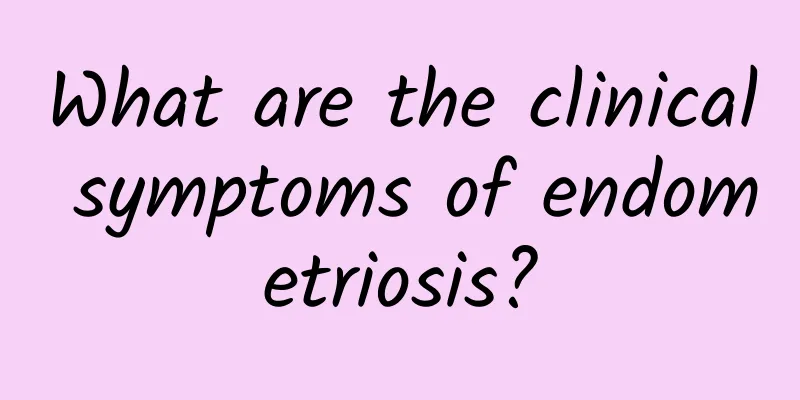Can endometrial hyperplasia turn into cancer? Nutritionist Huang Xiaotong: 5 dietary tips to prevent cancer

|
Will endometrial hyperplasia really progress to endometrial cancer? Ms. Wang had abnormal menstrual bleeding and went to see an obstetrician and gynecologist, who diagnosed her with endometrial hyperplasia. After endometrial scraping, the hyperplastic tissue was scraped off and sent for testing. Fortunately, the test results showed simple endometrial hyperplasia and no atypical cells were found. But Ms. Wang was still very worried and asked nutritionist Huang Xiaotong what she should pay attention to in her diet to reduce the risk of endometrial cancer. What is endometrial hyperplasia? Nutritionist Huang Xiaotong said that generally speaking, the endometrium will thicken and then shed with the changes in hormones during the menstrual cycle, and endometrial hyperplasia actually refers to the abnormal increase in the thickness of the endometrium and even abnormal changes in cells, which can be said to be a precursor to endometrial cancer. What is endometrial hyperplasia? It turns out to be related to "estrogen"The cause of endometrial hyperplasia is believed to be that the uterus is under the stimulation of estrogen for a long time and lacks progesterone to counteract it, which causes the endometrium to be in a thickened state for a long time and may even develop into endometrial cancer! The most obvious symptom of endometrial hyperplasia is abnormal menstruation or abnormal bleeding, which is especially likely to occur in postmenopausal women. Other people who are obese, have a Western diet, have polycystic ovary syndrome, excessive estrogen supplementation, or take Tamoxifen for breast cancer are also at high risk. There are 4 types of endometrial hyperplasia, each with a different chance of developing into cancerEndometrial hyperplasia can be divided into simple, complex, simple atypical and complex atypical types according to its tissue morphology. The risk of these four types developing into endometrial cancer is also different, namely simple 1%, complex 3%, simple atypical 8% and complex atypical 29%. Therefore, if abnormal endometrial hyperplasia is found, medical treatment should be sought promptly to prevent the occurrence of endometrial cancer. Abnormal endometrial hyperplasia, mainly medication and surgery, supplemented by dietThe main treatment methods are still medication and surgery, and Westernized eating habits that contain more fat and calories may have an impact on the occurrence of endometrial cancer, so adjusting your own diet and daily routine can also be helpful! Keep your body healthy, reduce hormonal imbalance, relieve stress appropriately and keep a happy mood. Nutritionist Huang Xiaotong provides the following dietary suggestions for your reference: Keep your body healthy, reduce hormonal imbalance, relieve stress appropriately and keep a happy mood. 5 dietary tips to prevent cancer1. Maintain ideal weight Obesity or excessive body fat increases the incidence of endometrial hyperplasia and endometrial cancer. The reason is that fat loss can lead to excessive production of estrogen, and too much estrogen leads to a higher risk of endometrial cancer. 2. Avoid exposure to dietary and environmental hormones In fact, just like uterine fibroids, you must try to avoid dietary or environmental hormones. For example, fish eggs, shrimp eggs, crab roe, egg yolk, etc. are foods with high hormone content or water bottles and canned foods (bisphenol A), preservatives (tributyltin), plastic products (plasticizers), detergents (nonylphenol), pesticides, heavy metals, etc. 3. Choose more anti-inflammatory foods It can reduce the inflammatory response of cells in the body. It is recommended to eat more dark green vegetables, fresh fruits, soybeans, nuts, olive oil, canola oil, and of course deep-sea fish rich in Omega 3. 4. Eat less "unhealthy" food Fried foods, refined sugars, pizza, burgers, cakes, cookies, etc. are all unhealthy foods that are high in fat, sugar and are overly refined. It not only causes obesity, but is also not conducive to preventing endometrial hyperplasia and endometrial cancer. Fried foods, refined sugars, pizza, burgers, cakes, cookies, etc. are all unhealthy foods that are high in fat, sugar and are overly refined. It not only causes obesity, but is also not conducive to preventing endometrial hyperplasia and endometrial cancer. 5. Exercise regularly In addition to helping maintain weight and reducing hormonal imbalance, exercise can also promote metabolism and keep the body in a healthy state. It is recommended to exercise 5 times a week, at least 30 minutes each time, and the heart rate should reach 110 beats per minute. |
Recommend
Can female cervical erosion be cured? Women should pay attention to these when treating cervical erosion.
Speaking of cervical erosion, it is indeed a gyne...
Experts explain the symptoms of cervical erosion
Cervical erosion is a very common gynecological d...
More than 50% of women are not physically active enough. 5 tips to be more beautiful
Love beauty, get moving! Domestic surveys show th...
Papaya helps with weight loss, can papaya seeds prevent cancer? Is papaya really good for breast enlargement? Must-read article
Papaya, once rated as the most nutritious fruit b...
Women should undergo pre-abortion examinations
There are many ways to help women solve the probl...
The best treatment for uterine fibroids How to treat uterine fibroids
Uterine fibroids are a benign tumor that not only...
Simple mild symptoms of cervicitis
Simple mild symptoms of cervicitis: In daily life...
What are the traditional Chinese medicine treatments for uterine fibroids?
What are the traditional Chinese medicine treatme...
What are the causes of irregular menstruation and how to effectively regulate irregular menstruation
Many women have very complicated emotions about m...
How to treat menopausal irregular menstruation
Menopausal irregular menstruation is a common pro...
Symptoms of pelvic inflammatory disease in women
Pelvic inflammatory disease mainly refers to infl...
Should patients with chronic cervicitis avoid certain foods? Patients with chronic cervicitis should pay attention to the three major dietary taboos
Patients with chronic cervicitis should not only ...
Routine diagnosis of cervical precancerous lesions
What is the basis for diagnosing cervical precanc...
The most important thing is the harm of abortion
Abortion is a very common operation in life, and ...
Can drugs completely cure cervical erosion? You should pay attention to these matters when treating cervical erosion.
Cervical erosion is a common cervical disease amo...









